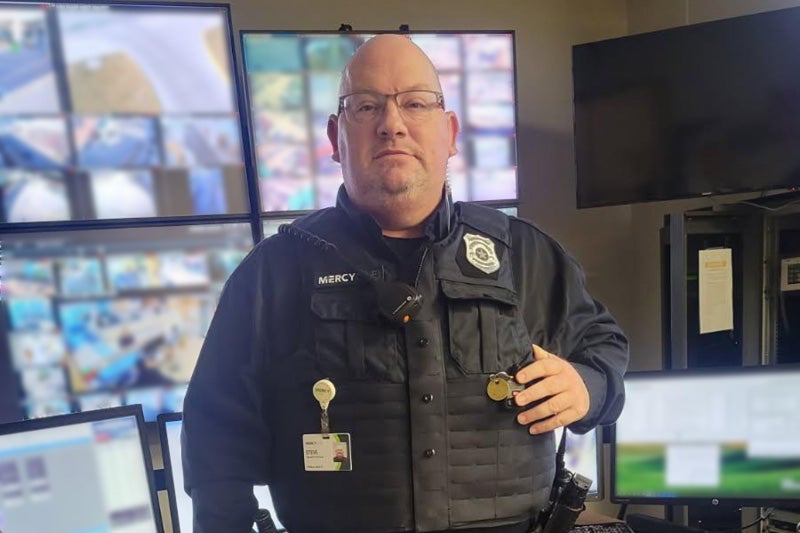Knowing stroke symptoms saves MercyOne colleague Steve Smith’s life
March 20, 2025Categories: Neurosciences Patient Stories

Learn more about Stroke Care Learn more about Neuroscience Care at MercyOne
Steve Smith, a security officer at MercyOne Des Moines Medical Center, was visiting with two fellow officers at work in May 2024 when he suddenly began slurring his words and acting differently. His co-workers recognized he was having a stroke because they knew the warning signs from the BE FAST stroke education campaign:
- Balance
- Eyesight changes
- Face drooping
- Arm weakness
- Speech difficulty
- Time to call 911
A race to care
MercyOne security officers Jacob Chalfant and Jacob Newberry called their supervisor, Ivan Wiliams, to tell him they thought Steve was having a stroke. Ivan agreed and told them to rush Steve to the Emergency Department immediately.
“We were working in the East Tower, and Jacob Chalfant put me in a wheelchair and literally ran me to the ER. I don’t remember most of it, but he got me there very quickly,” said Steve, an Army veteran. “I know Jacob’s quick reaction saved my life.”
Terri Hamm, MD, Stroke Coordinator for MercyOne Des Moines Medical Center affirms that Jacob had the correct response, “Stroke is an emergency. Early recognition and rapid transport to the Emergency Department offers the best opportunity to provide the appropriate care to the patient. Time is brain!”
In the Emergency Department, Steve says all the nurses were “fantastic and treated me like a brother.” An MRI and CT scan showed he not only had a stroke, but it wasn't the first time. “Apparently, I had a stroke before and I didn’t know it.”
MercyOne emergency care provider Melissa Horan-Smith, DO told Steve his carotid artery had a 69% blockage, which likely caused the stroke. The blockage wasn’t removed, but his providers continue to monitor it closely.
After admitting Steve for the night, his symptoms began to decrease. “I was getting better, so they didn't treat me with any medication. They said it would be better to not have further treatment since I was improving.” Within a few hours, Steve felt back to normal and was released from the hospital the next day. He spent the weekend at home resting and went back to work on Monday.
Steve says he felt perfectly fine leading up to the day he had the stroke, and he has no family history of stroke, “It came completely out of the blue.”
Time for lifestyle changes
Steve knew he had to make some pretty significant lifestyle changes. “I started smoking when I was serving in Iraq in the Army, so I quit that, which was very hard. My diet had to change as well. I was a big Coke drinker, and now I am only able to have one per day. I stopped drinking Gatorade, too, because of the high sodium in it. Plus, I eat a much healthier diet, and my wife and daughters make sure I'm sticking to that. I’ve lost some weight, and I’ll keep working on that.”
His wife of 27 years, Lenae, and two adult daughters were extremely concerned when they got the call that Steve was having a stroke. “We live about 15 minutes from the medical center. That day, my wife and one of my daughters who lives with us drove there in seven minutes.”
“I couldn’t ask for a better work family.”
Steve follows up with his neurologist every six months and with his primary care provider every three months. He did not have to do any rehabilitation, as he had no physical issues after the stroke, “The only thing I notice is that sometimes I know what I want to say, and I can’t get the words out. Other than that, I feel great.” The stroke didn't affect my golf game either. I’m still terrible. Through it all, Steve has kept his sense of humor and upbeat outlook on life.
For Steve, the positive outcome of his stroke story lies with his MercyOne family, “I firmly believe that time is of the essence with strokes. My colleagues saw the symptoms and acted immediately, and I'm so thankful for them. I’ve learned a lot about my health and diet through this process, but the main thing I learned is that my colleagues at MercyOne are part of my family. I’ve always been very fond of the people I work with here, and through that experience, that fondness has definitely deepened. I couldn’t ask for a better work family.”
If you want to better understand your risk for stroke, take our MercyOne Stroke Risk Assessment. Additionally, it's important to learn the BEFAST symptoms for yourself and others.
